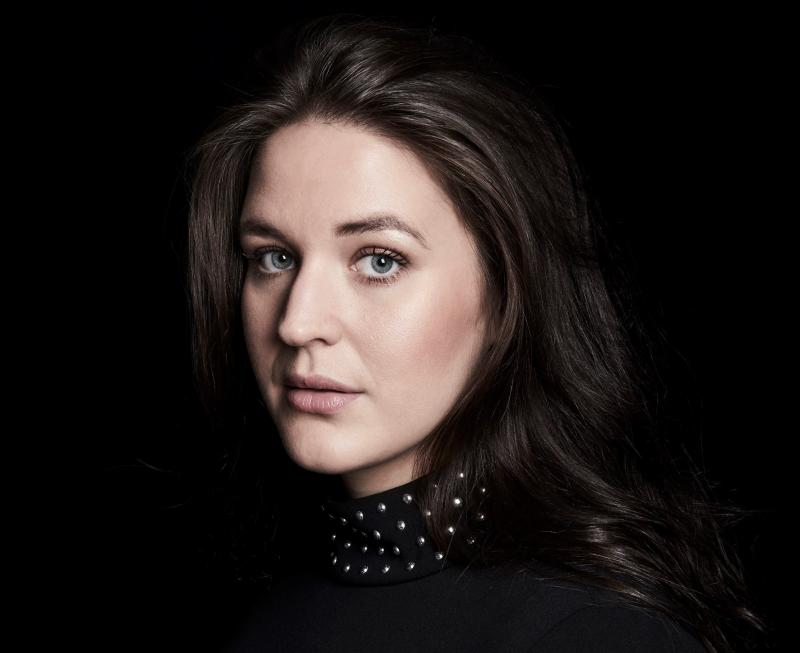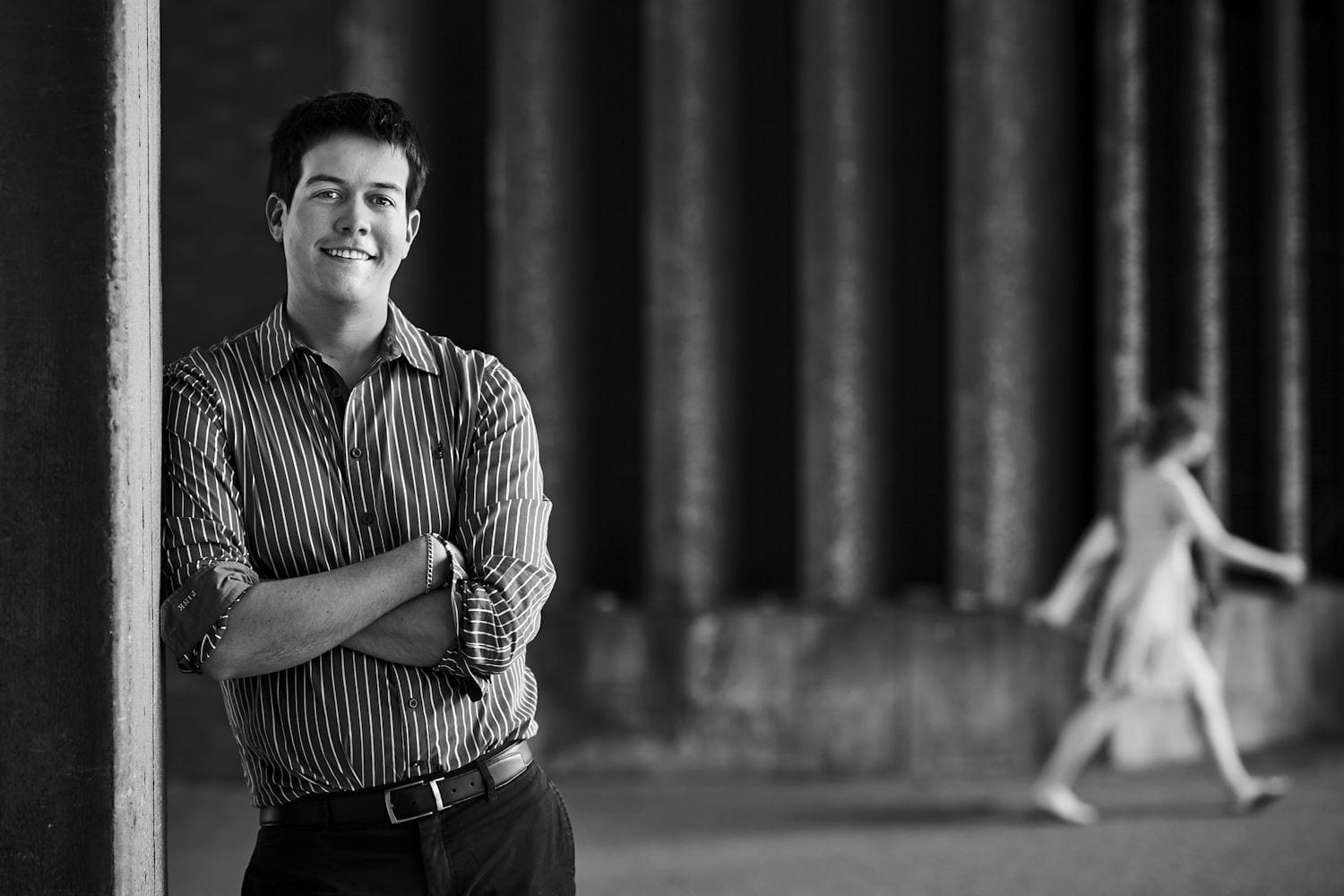Lise Davidsen, James Baillieu, Barbican review - opulence and the promise of greatness | reviews, news & interviews
Lise Davidsen, James Baillieu, Barbican review - opulence and the promise of greatness
Lise Davidsen, James Baillieu, Barbican review - opulence and the promise of greatness
German song not always in focus, but the soprano's Sibelius was awe-inspiring

So much pressure is on for Lise Davidsen to be the next Kirsten Flagstad or Birgit Nilsson, but the question has to be asked: is this just The Voice - a big "just" when a dramatic Wagnerian soprano is at stake - or The Complete Artist?
Though this tone-poem for voice and orchestra really needs more than piano accompaniment - somehow Sibelius conceives with a master painter's art - it allowed Davidsen to freeze her statuesque person, always a beautiful presence, for the epic narration of the Finnish creation myth. Fine by me that the Barbican's sometimes tricksy lighting design - a hideous green for Brahms, inept red for Grieg - settled on projecting the swelling sea over Davidsen's torso, since all was in the facial expression. We're used to hearing the work from lyric sopranos who can rise to the high notes of luminous sea-bird cries - Karita Mattila, Soile Isokoski, Susan Gritton, Anu Komsi - so to experience the application of the full dramatic works was a first for me. Davidsen, who will sing this all over the world as peerless interpreter, could do the scaling-down, too, and the haunting white notes, in the Swedish-language Sibelius song sequence: hypnotic in "Little Lasse", vividly dramatic in the ballad immortalised by Flagstad, "The girl returned from meeting her lover", ending on a unique hollow colour for the low-note last word.
Well-planned in symmetry to frame the Finnish master, present either side of the interval, the programme let him break out of the songs to German texts by Brahms, Schumann, Grieg and Strauss. Davidsen's placement in this language is sometimes recessed, and there were times when Baillieu (pictured below by Kaupo Kikkas) drew more focus in exquisite intimacy (the progressions of Grieg's "One day, my thoughts, you shall be at rest", miraculous).  Yet she drew upon mezzo resources for the voice of the mother in Brahms's "Liebestreu" ("True Love"), and in a less well-proportioned Strauss sequence, the subtle tone painting of a modest but harmonically elusive epilogue to a life in song-writing, "Malven" ("Hollyhocks"), stood out (Davidsen, incidentally, was less well advised to choose the Four Last Songs in her debut recording, hit and miss). There's an inherent danger at times in the spread of the voice, which doesn't always allow for a perfect legato, though I don't want to join the doomsayers in warning of trouble ahead without due care and marshalling of resources.
Yet she drew upon mezzo resources for the voice of the mother in Brahms's "Liebestreu" ("True Love"), and in a less well-proportioned Strauss sequence, the subtle tone painting of a modest but harmonically elusive epilogue to a life in song-writing, "Malven" ("Hollyhocks"), stood out (Davidsen, incidentally, was less well advised to choose the Four Last Songs in her debut recording, hit and miss). There's an inherent danger at times in the spread of the voice, which doesn't always allow for a perfect legato, though I don't want to join the doomsayers in warning of trouble ahead without due care and marshalling of resources.
Sometimes you don't always want to know the words for Strauss Lieder: when they're up there in English translation behind the singer, you realise that the texts he chose are limp alongside those of Sibelius's favourite poet, Runeberg, and the directness of the lines attributed to Mary, Queen of Scots which Schumann set not long before his untimely end. Conveying one emotion per song, these again allowed Davidsen to settle to her nobler mode, and the spoken introduction plus Baillieu's interjection before the final Prayer helped the mood of devotional concentration.
No objections, either, to Davidsen's vote of thanks before her official final song, "Cäcilie"; you can tell she's a genuinely nice and humble person. First of the encores, Sibelius's "Svarta rosor" ("Black roses"), found Davidsen at her ringingly dramatic best, though it's a brave singer who chooses the almost-whispered intimacies of Strauss's "Morgen" ("Tomorrow") at the end of a taxing evening: here Baillieu again carried the magic. No doubt about it, though, this is a voice of a warm amplitude we haven't heard for a very long time, and experience will give Davidsen the confidence to give it dramatic significance every time.
The future of Arts Journalism
You can stop theartsdesk.com closing!
We urgently need financing to survive. Our fundraising drive has thus far raised £49,000 but we need to reach £100,000 or we will be forced to close. Please contribute here: https://gofund.me/c3f6033d
And if you can forward this information to anyone who might assist, we’d be grateful.

Subscribe to theartsdesk.com
Thank you for continuing to read our work on theartsdesk.com. For unlimited access to every article in its entirety, including our archive of more than 15,000 pieces, we're asking for £5 per month or £40 per year. We feel it's a very good deal, and hope you do too.
To take a subscription now simply click here.
And if you're looking for that extra gift for a friend or family member, why not treat them to a theartsdesk.com gift subscription?
more Classical music
 Bizet in 150th anniversary year: rich and rare French offerings from Palazzetto Bru Zane
Specialists in French romantic music unveil a treasure trove both live and on disc
Bizet in 150th anniversary year: rich and rare French offerings from Palazzetto Bru Zane
Specialists in French romantic music unveil a treasure trove both live and on disc
 Scottish Chamber Orchestra, Ibragimova, Queen’s Hall, Edinburgh review - rarities, novelties and drumrolls
A pity the SCO didn't pick a better showcase for a shining guest artist
Scottish Chamber Orchestra, Ibragimova, Queen’s Hall, Edinburgh review - rarities, novelties and drumrolls
A pity the SCO didn't pick a better showcase for a shining guest artist
 Kilsby, Parkes, Sinfonia of London, Wilson, Barbican review - string things zing and sing in expert hands
British masterpieces for strings plus other-worldly tenor and horn - and a muscular rarity
Kilsby, Parkes, Sinfonia of London, Wilson, Barbican review - string things zing and sing in expert hands
British masterpieces for strings plus other-worldly tenor and horn - and a muscular rarity
 From Historical to Hip-Hop, Classically Black Music Festival, Kings Place review - a cluster of impressive stars for the future
From quasi-Mozartian elegance to the gritty humour of a kitchen inspection
From Historical to Hip-Hop, Classically Black Music Festival, Kings Place review - a cluster of impressive stars for the future
From quasi-Mozartian elegance to the gritty humour of a kitchen inspection
 Shibe, LSO, Adès, Barbican review - gaudy and glorious new music alongside serene Sibelius
Adès’s passion makes persuasive case for the music he loves, both new and old
Shibe, LSO, Adès, Barbican review - gaudy and glorious new music alongside serene Sibelius
Adès’s passion makes persuasive case for the music he loves, both new and old
 Anja Mittermüller, Richard Fu, Wigmore Hall review - a glorious hall debut
The Austrian mezzo shines - at the age of 22
Anja Mittermüller, Richard Fu, Wigmore Hall review - a glorious hall debut
The Austrian mezzo shines - at the age of 22
 First Person: clarinettist Oliver Pashley on the new horizons of The Hermes Experiment's latest album
Compositions by members of this unusual quartet feature for the first time
First Person: clarinettist Oliver Pashley on the new horizons of The Hermes Experiment's latest album
Compositions by members of this unusual quartet feature for the first time
 Gesualdo Passione, Les Arts Florissants, Amala Dior Company, Barbican review - inspired collaboration excavates the music's humanity
At times it was like watching an anarchic religious procession
Gesualdo Passione, Les Arts Florissants, Amala Dior Company, Barbican review - inspired collaboration excavates the music's humanity
At times it was like watching an anarchic religious procession
 Classical CDs: Camels, concrete and cabaret
An influential American composer's 90th birthday box, plus British piano concertos and a father-and-son duo
Classical CDs: Camels, concrete and cabaret
An influential American composer's 90th birthday box, plus British piano concertos and a father-and-son duo
 Cockerham, Manchester Camerata, Sheen, Martin Harris Centre, Manchester review - re-enacting the dawn of modernism
Two UK premieres added to three miniatures from a seminal event of January 1914
Cockerham, Manchester Camerata, Sheen, Martin Harris Centre, Manchester review - re-enacting the dawn of modernism
Two UK premieres added to three miniatures from a seminal event of January 1914
 Kempf, Brno Philharmonic, Davies, Bridgewater Hall, Manchester review - European tradition meets American jazz
Bouncing Czechs enjoy their Gershwin and Brubeck alongside Janáček and Dvořák
Kempf, Brno Philharmonic, Davies, Bridgewater Hall, Manchester review - European tradition meets American jazz
Bouncing Czechs enjoy their Gershwin and Brubeck alongside Janáček and Dvořák
 Solomon, OAE, Butt, QEH review - daft Biblical whitewashing with great choruses
Even a top soprano and mezzo can’t make this Handel paean wholly convincing
Solomon, OAE, Butt, QEH review - daft Biblical whitewashing with great choruses
Even a top soprano and mezzo can’t make this Handel paean wholly convincing

Add comment